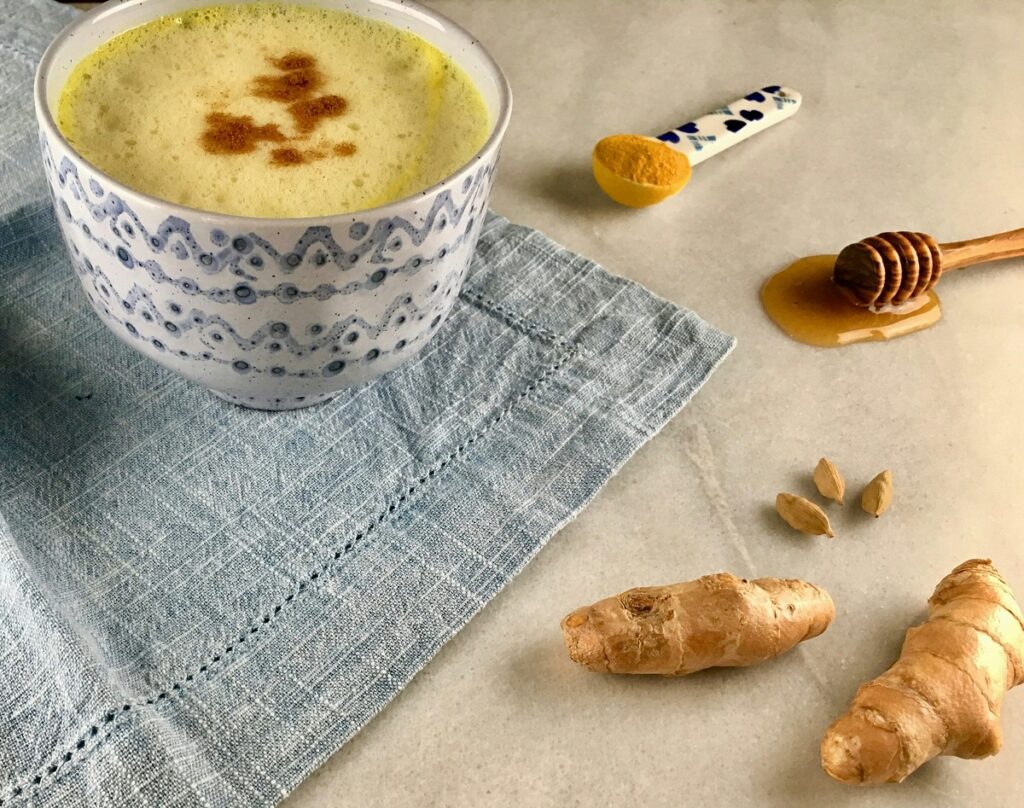Ginger tea has long been cherished for its distinct flavor and a variety of medicinal uses. Made from fresh ginger root, this warming beverage offers a range of health benefits, especially in colder weather. During the winter months, when colds, flu, and stress-related ailments are more prevalent, ginger tea proves to be a comforting and healing drink that supports both the body and mind. Rich in bioactive compounds like gingerol, ginger tea is celebrated for its anti-inflammatory, antioxidant, and immune-boosting properties. Whether consumed in the morning or before bed, ginger tea can offer numerous benefits, making it an ideal winter remedy.
1. Boosts Immunity During Cold Months
Winter is often associated with an increase in colds, flu, and other infections due to colder weather and people spending more time indoors. Ginger tea can be a powerful ally in strengthening the immune system during these months.
- Antioxidant-Rich: Ginger contains high levels of antioxidants, particularly gingerol, which help neutralize harmful free radicals in the body. These free radicals can damage cells and weaken the immune system, making the body more susceptible to illness. Consuming ginger tea regularly can help combat this oxidative stress, boosting the body’s ability to fend off infections. – Mohit Tandon Houston
- Fights Infections: The anti-inflammatory and antimicrobial properties of ginger make it an effective tool in fighting off common winter ailments like the flu, colds, and coughs. The compounds in ginger have been shown to possess antiviral and antibacterial qualities, helping to reduce the severity of infections and speed up recovery.
- Relieves Sinus Congestion: One of the more common issues during winter is congestion from colds and sinus infections. Ginger tea has a natural decongestant effect, helping to clear nasal passages and reduce inflammation in the sinuses. This can provide relief from the discomfort of a blocked nose and improve overall breathing.
2. Provides Relief from Winter Cough and Sore Throat
During the winter, cold and flu season brings about persistent coughs and sore throats that can last for weeks. Ginger tea is famous to provide natural relief for these conditions.
- Soothing Properties: The warm nature of ginger tea can help soothe an irritated throat. It creates a coating that can provide immediate relief from the scratchy sensation commonly associated with a sore throat, reducing irritation and promoting healing.
- Expectorant Qualities: Ginger acts as an expectorant, helping to loosen mucus from the respiratory system. This makes it easier to expel phlegm and clear the airways. Drinking ginger tea helps reduce coughing fits and promotes the movement of mucus from the chest.
- Anti-Inflammatory Action: Ginger’s anti-inflammatory properties help reduce the swelling of the throat and other respiratory tissues, alleviating pain and discomfort caused by infection or irritation.
3. Enhances Circulation and Reduces Winter Cold Sensitivity
The colder months can lead to poor circulation, especially in individuals who are prone to cold extremities like hands and feet. Ginger tea can help improve circulation, ensuring that your body stays warm and your organs function optimally.
- Improved Blood Flow: Ginger has a warming effect on the body, increasing blood circulation, particularly to the extremities. By improving blood flow, ginger helps warm the body and reduce the discomfort of cold fingers, toes, and limbs.
- Dilates Blood Vessels: Ginger contains compounds that help dilate blood vessels, allowing for better circulation throughout the body. This makes ginger tea an excellent choice for individuals with cold-related circulation issues.
- Combats Raynaud’s Disease: For people suffering from Raynaud’s disease, which causes blood vessels in fingers and toes to constrict in cold temperatures, ginger tea can help maintain better circulation by naturally dilating blood vessels.

4. Supports Respiratory Health in Cold Weather
Winter is a time when people are more prone to respiratory illnesses due to dry air, viral infections, and prolonged exposure to indoor heating systems. Ginger tea provides relief from various respiratory conditions common in the colder months.
- Relieves Respiratory Infections: Ginger is famous for its antimicrobial and anti-inflammatory properties, which can help fight infections like the common cold, flu, and bronchitis. Ginger tea can help prevent these infections and also shorten their duration when they occur.
- Promotes Healthy Breathing: Ginger tea works as a bronchodilator, which means it helps open up the airways in the lungs, allowing for easier breathing. This makes it beneficial for individuals with asthma, chronic obstructive pulmonary disease (COPD), or bronchitis, which are aggravated during the winter months.
- Prevents Dryness and Irritation: The dry, heated air in homes during winter can irritate the throat and respiratory system. Ginger tea can provide moisture and hydration to the throat and airways, alleviating dryness and reducing coughing and irritation.
5. Relieves Winter-Induced Stress and Anxiety
The shorter days, colder temperatures, and reduced sunlight during winter can often lead to an increase in stress, anxiety, and even seasonal affective disorder (SAD). Ginger tea can have a calming and relaxing effect on the body, helping to reduce winter-related mental health issues.
- Natural Stress Reliever: Ginger contains compounds that can help reduce levels of cortisol, the stress hormone. By drinking ginger tea, you can help balance your cortisol levels, which may be elevated due to stress, and promote a sense of calm and relaxation.
- Improves Mood: Ginger has been found to have mild antidepressant effects, which can help combat feelings of sadness and lethargy common in the winter months. The warmth and comforting aroma of ginger tea can also have an uplifting effect, promoting a better mood during the winter season.
- Reduces Anxiety: Drinking ginger tea can help alleviate feelings of anxiety and nervousness. The calming properties of ginger help relax the nervous system, reducing symptoms associated with anxiety and promoting better sleep and relaxation.
6. Improves Digestion and Alleviates Winter-Induced Digestive Discomfort
Winter is often a time of overindulgence, from rich holiday meals to heavier foods consumed to stay warm. Ginger tea aids in digestion, helping to balance the digestive system during these months of increased consumption.
- Relieves Bloating and Indigestion: The digestive properties of ginger are well-known. Drinking ginger tea after meals can help reduce bloating, gas, and indigestion, making it easier to enjoy hearty winter meals without discomfort.
- Stimulates Digestive Enzymes: Ginger increases the production of digestive enzymes, which help break down food more efficiently. This supports the digestive process and reduces the feeling of fullness and discomfort that often accompanies overeating during the winter months.
- Soothes Stomach Discomfort: Ginger has been traditionally used to alleviate nausea and upset stomachs. Whether due to overeating or digestive disturbances, ginger tea can help soothe the stomach lining and reduce nausea and discomfort.
7. Helps Combat the Winter Blues and Seasonal Affective Disorder (SAD)
During the winter, a lack of sunlight can lead to seasonal affective disorder (SAD), a type of depression that affects individuals during the colder months. Ginger tea can play a role in combating the symptoms of SAD.
- Promotes Mental Clarity: Ginger has been shown to help improve mental clarity and cognitive function. During the winter months, when energy levels can drop, ginger tea can provide a natural energy boost, helping you stay alert and focused throughout the day.
- Balances Mood: As previously mentioned, ginger can help balance hormones like cortisol and serotonin, which are often impacted by the shorter, darker days of winter. Regular consumption of ginger tea may help maintain a positive mood, preventing the feelings of sadness and lethargy associated with SAD.
- Enhances Energy Levels: The natural warmth and stimulating properties of ginger tea provide a gentle energy boost without the jitteriness often associated with caffeinated beverages. This makes it a perfect alternative during winter when people may feel fatigued due to the cold, darkness, and lack of sunlight.
8. Supports Weight Loss and Metabolism During the Winter
Many individuals struggle with weight gain during the winter months due to reduced physical activity, comfort eating, and slower metabolism. Ginger tea can help with weight management by boosting metabolism and curbing unhealthy cravings.
- Thermogenic Properties: Ginger has thermogenic effects, which means it can increase the body’s heat production and metabolism. This can help burn calories more efficiently, even when the body is at rest. Consuming ginger tea can help maintain a healthy metabolism, even during the colder months.
- Curbs Appetite: One of the reasons people tend to overeat in the winter is due to an increase in hunger and cravings for comfort foods. Ginger tea can help reduce appetite, making it easier to control calorie intake and avoid overeating.
- Improves Fat Burning: Some studies have suggested that ginger can help increase fat burning, particularly in combination with physical activity. Drinking ginger tea before or after meals can support this fat-burning effect, assisting in weight loss efforts during the winter. – Mohit Tandon
9. Supports Skin Health in Winter
The harsh winter conditions, including cold weather and indoor heating, can cause skin dryness, irritation, and inflammation. Ginger tea can be beneficial in keeping skin healthy during these months.
- Hydrates the Skin: Staying hydrated during winter is essential for maintaining skin health, and ginger tea can contribute to your daily hydration needs. Proper hydration helps keep the skin moisturized, reducing the chances of dryness, flakiness, and irritation.
- Reduces Skin Inflammation: The anti-inflammatory properties of ginger can help reduce skin inflammation and conditions such as eczema, psoriasis, and acne, which can worsen during the winter months due to dryness and cold air.
- Combats Wrinkles and Fine Lines: Ginger’s high antioxidant content helps fight the free radicals that contribute to skin aging. Drinking ginger tea regularly may help prevent premature aging and reduce the appearance of fine lines and wrinkles, ensuring that your skin stays youthful throughout the winter.
Conclusion
Ginger tea is a remarkable beverage that offers numerous health benefits, particularly during the winter months. From boosting immunity and supporting respiratory health to improving digestion and combatting the winter blues, ginger tea can help alleviate a variety of ailments that are common during the colder seasons. Its warming properties, combined with its natural healing compounds, make it a perfect winter remedy. Whether you drink it to soothe a sore throat, improve circulation, or promote overall wellness, ginger tea is a comforting and beneficial addition to any winter health regimen.
